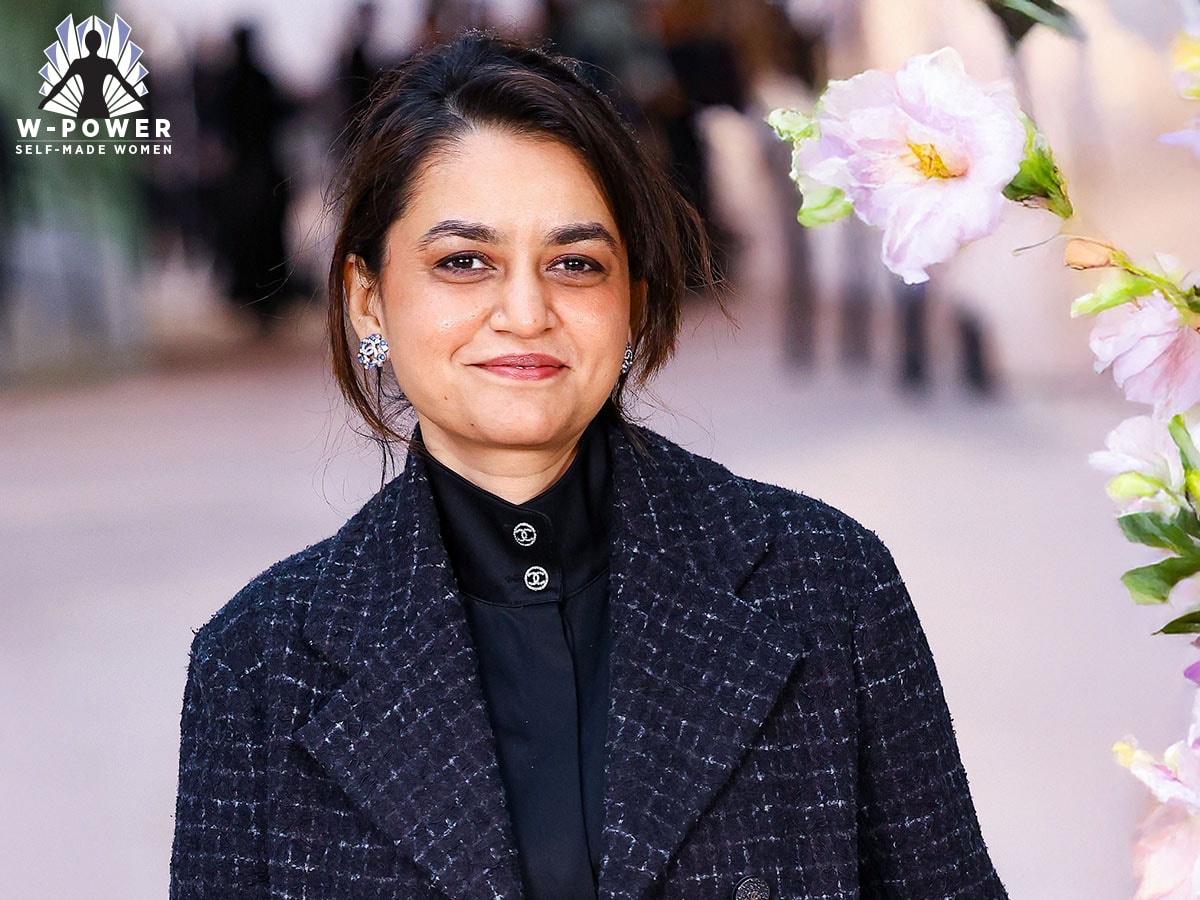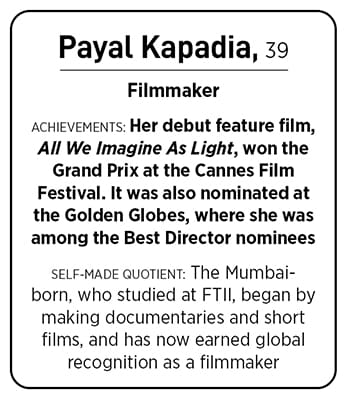 Filmmaker Payal Kapadia
Filmmaker Payal Kapadia
Image: Marc Piasecki/Wireimage; Imaging: Kapil Kashyap
Actor Chhaya Kadam was all ears when she met filmmaker Payal Kapadia for the first time. Prior to collaborating on the latter’s 2024 directorial All We Imagine As Light, the duo had several conversations about life and films. “Her knowledge about cinema and her experiences at FTII (Film and Television Institute of India) left me mesmerised,” recalls Kadam. “More importantly, I felt proud that she had done a thorough research about her subject—Mumbai, chawls, health care workers—and that she acutely understood the pain of others and made a film around that.”
All We Imagine As Light, a story about two nurses, and a cook working at their hospital—whose chawl is under threat of being demolished by a scrupulous builder who wants to build a skyscraper there—won the Grand Prix at the Cannes Film Festival. It was also in the running for the Best Foreign Language Film at the Golden Globes along with a nomination for Kapadia for Best Director. Among several other international accolades and critical acclaim in India, it was even nominated for the British Academy Film Awards (BAFTA).
 “This is a small movie, made through the struggles of many people pooling resources. The fact that it’s here with all these amazing films is something I feel truly honoured by,” Kapadia had said at the Golden Globes red carpet.
“This is a small movie, made through the struggles of many people pooling resources. The fact that it’s here with all these amazing films is something I feel truly honoured by,” Kapadia had said at the Golden Globes red carpet.
Those who know the Mumbai-born Kapadia, 39, are not surprised at her success. Film programmer Deepti DCunha describes her as a talented filmmaker whose short films made it to Cannes and Berlinale Shorts. “Payal is a serious student of cinema… she is an incredible cinephile,” says DCunha, who has known the director professionally from her FTII days. “She’s a filmmaker with a strong voice of her own. Her stories and screenplay have a cinematic quality to them, but she also pays great attention to the cinematography and how the image should be created.”
Click here for full list
Agrees Abhra Das, a film festival professional and film curator, who first met Kapadia when he was doing a film appreciation course at the FTII in 2017. He remembers watching her short film Afternoon Clouds then and thinking how different it was from everything else that he had seen. “It was experiential and shot entirely in a studio setup. You feel a certain mood gets created with her films. You get transported to that particular place [the location that is depicted on screen],” says Das, who was also Kapadia’s junior at Social Communications Media, Sophia College, Mumbai, from where she did her Master’s.
Kadam fondly recalls the workshops involving all actors at Kapadia’s home prior to shooting All We Imagine As Light. She says they discussed and worked on all the scenes with every individual’s perspective. And they enacted them in those myriad ways with different emotions before the actual shoot took place. “Payal is a fantastic director,” she says, adding that those sessions also made a difference to the final script.
Also read: I always give my best so that I don’t regret it later: Manu Bhaker
Spending so much time together allowed Kadam to get rare insights into Kapadia, the person, and not just the artiste. Over time, they developed so much trust and comfort that the actor says she could open up to the filmmaker and discuss her vulnerabilities. “She is like a child. She loves to have fun and enjoy,” says Kadam. “However, when the topic turns serious, she can speak at length about that too.”
Kapadia’s moment in the spotlight is unlikely to change her as an individual, emphasises Kadam. She says just when you think she has won at Cannes and look at her in awe, she’ll come and whisper child-like things in your ears. “Payal has surprised me from day one. And she continues to surprise me even now,” she adds.
After the success of her first feature film, there’s been tremendous anticipation about what Kapadia makes next. Recently, the filmmaker disclosed that she is developing two films, both set in Mumbai. “She has a lifetime of making films. And, I am sure, with every film, we are going to be met with great cinema. There’s a lot to learn from the way Payal approaches cinema,” says DCunha. “What I am most excited about is that she is a Mumbai filmmaker and, for her, the city is a muse.”

Das, who saw the frenzy when All We Imagine As Light premiered at the MAMI Mumbai Film Festival, feels it helps that Kapadia knows her subject. “If you listen to what Payal says, you know that she understands her privilege. She is aware of the city she belongs to, the story she is telling and the class of people she is portraying on screen,” he says. “She is a strong filmmaker. And whenever she is helming a film, it is exciting for cinephiles to see what she will make.”
It’s hard to predict what Kapadia will do next, believes Kadam, explaining that the filmmaker is not someone who will try to make another movie soon just to cash in on All We Imagine As Light’s popularity. “Payal is not a person who will think ‘I have to prove something’. She will only do what she likes and what gives her great joy,” she says.
(This story appears in the 18 April, 2025 issue
of Forbes India. To visit our Archives, click here.)
 Filmmaker Payal Kapadia
Filmmaker Payal Kapadia
 “This is a small movie, made through the struggles of many people pooling resources. The fact that it’s here with all these amazing films is something I feel truly honoured by,” Kapadia had said at the Golden Globes red carpet.
“This is a small movie, made through the struggles of many people pooling resources. The fact that it’s here with all these amazing films is something I feel truly honoured by,” Kapadia had said at the Golden Globes red carpet.
